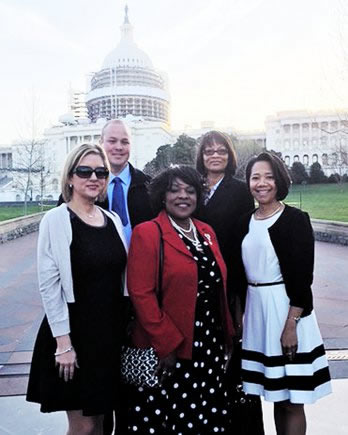Civilians Attend the CJ Reddy Leadership Conference

Two Army Medicine civilians participated in this year's C.J. Reddy Leadership Conference at Defense Health Headquarters in Falls Church, Virginia, as part of a group of the first civilians to attend the conference since its beginning.
The Army Nurse Corps sponsors the annual C.J. Reddy Leadership Conference in Washington, D.C. This year the conference was open to all Corps, to include the Army Medicine civilians. The conference is a five-day leadership development symposium and includes exposure to a variety of inter-professional and interagency activities.
The representatives selected to attend the conference this year were Sean Pulsipher and Winsome Panton from Barquist Army Health Clinic in Fort Detrick, Maryland.
"The active duty officers we happy to have us join them and give them a civilian perspective and to help them better understand our role in assisting to accomplish the Army's mission," said Pulsipher. "It was an excellent opportunity to learn from the great leaders that spoke at the conference."
The C.J. Reddy Leadership Conference was named in honor of retired Army Col. Charles J. Reddy, a long-time Army nurse recognized for his leadership qualities and enthusiasm for developing junior leaders. Reddy, during his tenure, specialized in clinical practice, education, administration support and research.
The conference was first organized and held in June of 1992 with the goal of encouraging junior officer leadership development. During the course, attendees are provided the opportunity to meet and work with ANC officers in key leadership positions, allowing them to gain a unique insight into the future of Army nursing.
"The Barquist Army Health Clinic is very fortunate to have been able to send Mrs. Panton and Mr. Pulsipher to the conference," said Barquist Commander Lt. Col. Jason Sepanic. "It was a great experience for them to be able to hear directly from the Surgeon General and other Army Medicine senior leaders about the direction military medicine is heading, and then being able to meet AMEDD Officers from across the Army and discuss what they had been briefed on and the challenges each of them face was invaluable."
One of the primary goals of the conference is to give participants a better understanding of the military health system, building critical knowledge and experiences that will enable them to address future complex issues within Army Medicine and the Department of Defense.
"Both of them came back inspired and with a greater understanding of where they fit in the grand scheme of Army Medicine and the impacts they make every day," said Sepanic. "Not only did they grow professionally and personally, but they have been sharing what they learned with their peers and Barquist is a better organization because of it."
 An official website of the United States government
An official website of the United States government
 ) or https:// means you've safely connected to the .mil website. Share sensitive information only on official, secure websites.
) or https:// means you've safely connected to the .mil website. Share sensitive information only on official, secure websites.


